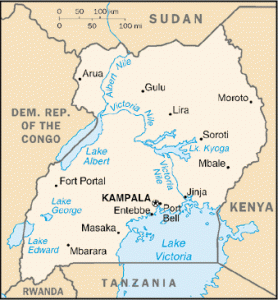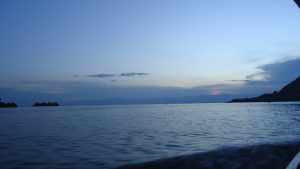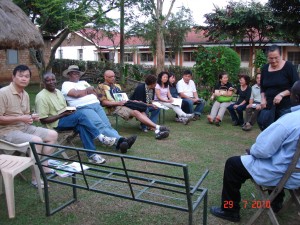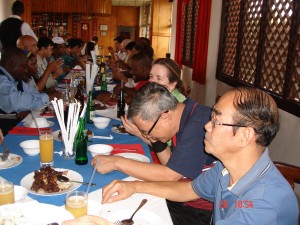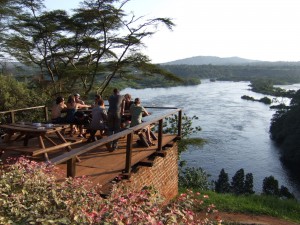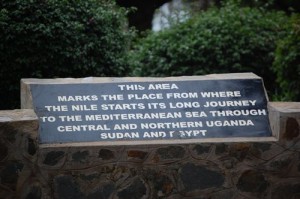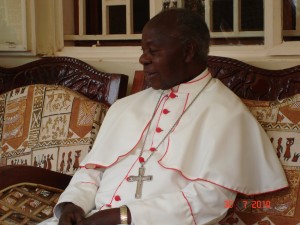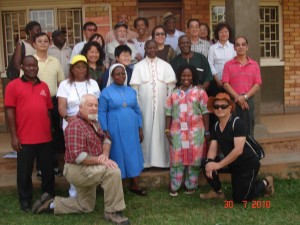A Pilgrimage of Pain and Hope – UGANDA [1]
“Take off your shoes, for the place on which you stand is holy ground” [Exodus 3:5b].
[L] Uganda lies on the northwestern shores of Lake Victoria. [M] Lake Victoria from Entebbe. [R] Grey Crowned Crane, Uganda’s national bird.
Sometimes life delivers moments of surprising insights, shattering old stereotypes and fragile illusions like so many soap bubbles. Our 2010 Uganda pilgrimage was one such shattering moment, and more.
Somehow, silently and unobtrusively, by the time we were homebound, we realized that a deep spiritual transformation has been working its way deep into our souls – now overtaken by a somewhat different, certainly blissful, and somehow purpose-filled sense of restlessness.
“That was a pilgrimage with a difference!”
Without exception, our 23-member group that went on a pilgrimage of pain and hope in July 2010 through southern Uganda experienced and treasured that truth.
And yet, in the beginning, many things had conspired to try and halt the pilgrimage, to render it stillborn.
On July 11, exactly 11 days before we were to begin our journey, terrorists set off bombs in Kampala, killing more than 70 football fans gathered to watch the World Cup final and wounding many more. Apart from unsettling the local population, the bomb attacks shook the confidence of some of the pilgrims who had signed up, making it easier for lesser excuses and “external voices” to seep through the cracks. The pilgrimage group was at the brink of being thrown asunder. Maria Liu, a professor of dentistry residing in Amsterdam who originally hailed from Inner Mongolia of China, with whom we bonded well since our Louvain days, gave the best response imaginable when she wrote confidently to affirm her participation, dismissing with contempt the bombing incidence, and refusing to let a “small” act of terrorism affect our trip. And as the pilgrimage unrolled and everyone was beginning to experience how immensely powerful it was, some pilgrims shared the “guilt-feeling” they had soon after the bomb blasts for planning to pull out of the trip, knowing that it would seriously affect the group. That was a revealing moment as we marveled, even with humour, at an early lesson on this pilgrimage: guilt stands at the origin of immense grace and blessings. From then on, too, the concept of origins of things – the biblical “in the beginning” in the first three words of the first book of the Bible which Fr Emmanuel Katongole, our pilgrimage organizer and spiritual guide, is fond of using, became a focus of many a reflection.
On our part, we were keen to test our hypothesis, born of experience, that the more one is at first reluctant to attend an event, especially a religious or spiritual event, and yet obliges oneself to go nevertheless, the greater are the chances that one will come out of the event thanking God that one did go after all.
The Bible testifies to that. “In the beginning” Abram and Sarai were doing fine in Ur of the Chaldeans – land, cattle, servants, friends, status in community, a good life, a long life – and had no reason to leave their home when YHWH invited, called and drew them to a journey, to leave their old country and come to a new land YHWH would show them. Abram and Sarai went because God said He had plans for their future.
But surely, Uganda – this “new land” to every foreign visitor in the group – is way off the popular beaten tracks of religious and spiritual pilgrimages, is it not? So why call it a “pilgrimage” and not just a tour? In religion and spirituality, a pilgrimage usually refers to a trip to a sacred place or shrine of importance to a person’s beliefs and faith. Members of every religion participate in pilgrimages. The more popular Catholic pilgrimages are to the Holy Land, sites of Marian apparitions, famous churches in Rome and Assisi, Pauline journeys and so on. But Uganda? What could Uganda possibly offer? [Recall John 1:46 – “Can anything good come out of Nazareth?”]
Stereotypes and old prejudices began to crumble very early in the trip. In fact, it began the moment we landed at Entebbe. Sitting more than 1,000 metres above sea level on the great East African Plateau, the Southern Ugandan air was cool and fresh. Cooler by some ten degrees or so than Malaysia on account of its geographical elevation, even though the Equator cuts across both countries, and far less humid, Uganda was such a welcome relief from the oppressive heat and sweat of July in Malaysia. Entebbe itself is a resort town offering breath-taking views of Lake Victoria, with lovely tree-lined avenues and some unusual and interesting buildings dating back to the 1930s and 40s. Where are all the flies we saw on TV of a typical African scene? Where is all that chaos, war and violence we have expected to see but feared to encounter? None. Nothing, except the broad smiles of the welcoming party saying, “Welcome!” – literally the first word we heard from the Ugandan immigration officer, and repeated by young and old everywhere we visited, said or sung by broadly smiling Ugandan lips. These Ugandan people are really beautiful!
And standing right below the airport digital display board showing flight arrivals was the welcoming party headed by Fr. Emmanuel Katongole (Fr EK to the Malaysians or Fr Emma to the Americans), a Ugandan priest, a professor at Duke University, North Carolina, USA, co-director of the University’s Center for Reconciliation that gathers people from all sectors of life for summer institutes, study weeks, peace initiatives, and international conferences in the United States and in Africa, and an old friend and colleague from our Louvain, Belgium connections. They pointed to the display board: we have arrived by Emirates Airlines flight EK723 on July 23 in response to an invitation by EK! That realisation sent a minor shockwave across the Malaysian contingent. Somehow, we wondered, was it not YHWH God, through EK, who called us to this “new land” that He was going to show us? What plan has the Almighty for the future of us Malaysians now?
From then on, it was real easy for us to connect with Emmanuel’s daily morning briefing in the bus, beginning with a Bible reflection, and with the rest of the group at the evening debriefing through free sharing.
[L] Getting ready for an evening debrief at the Reparatrix Sisters Convent ground. [M] On the road together. [R] Eating together. Plenty of Ugandan beer.
On the first morning, we read the burning bush narrative from Exodus 3 at Mass. That set the right tone for us. Instinctively, we were alerted to the fact that we were on “holy ground”! “Take off your shoes” meant for us: be respectful; open our hearts; see; listen; learn; and be touched.
Missing only one member from Chicago on account of medical emergency at home, our group of 23 comes from four continents – Africa, Europe, North America and Asia. A very mixed group, we have three priests, one religious sister and a permanent deacon, professors and businessmen and women, theologians and housewives, an eleven-year-old and quite a few senior citizens, from different stations in life, of all colours and shades, and of all creatures big and small. And yet, even as we witnessed to the catholicity of the Church, we could not help but be amazed by the grace of Christ and the power of the Spirit that could bond such a diverse group in deep friendship. What plans did God have for us? For eleven days, we believed and we lived YHWH God’s blessing to Abram and Sarai: “I will bless you so that you will be a blessing to others” [see Genesis 12:1-9].
While the pilgrimage was themed on “pain and hope”, and everyday our visit would take us to a place and people who inspired us and brought tears to our eyes, we did not forget to spend some relaxing time and take in some scenic spots as well. So we went to a local cultural show, which prompted our youngest pilgrim to remark: “Before I came, I thought I would be seeing animals and violence, but now I am seeing beautiful scenery and very talented young people.”
We went to the place where the Englishman John Hanning Speke allegedly discovered the source of the Nile on 28th July 1862. Disputes on the accuracy of this “discovery” notwithstanding, it stood at the origin of development and growth for Uganda. Speke’s announcement at the Royal Geographic Society gave Uganda a new beginning as international recognition brought foreign attention, visitors and missionaries from the West, and new economic activities. Not every development was good, however. Just as the King of tiny Belgium had for years treated Congo, some 80 times bigger in land size, as his rich personal backyard, so too were the colonialists enriching themselves from the colony of Uganda. Like everywhere else in the world, it’s the poor that suffer the most and benefit the least. Christ has special messages for such a situation. To be of real service, leaders must resolve to have the interests of the people and the country at heart first.
[L & M] “Source of the Nile” at Jinja. [R] A lion and lioness, just before feeding time.
And we went to the nearby Jinja rapids to see local boys putting on a show, risking their necks braving the rapids for a fee.
And of course we went to the National Zoo to see African lions and their mortal enemies the hyenas. We were quite taken aback by how huge the hyenas actually were. Our relatively short trip also meant that we did not leave sufficient time to make a trip to a game park originally planned.
It was most fitting that our schedule included a courtesy visit on Emmanuel Cardinal Emeritus Wamala on the Malaysian contingent’s final day of the pilgrimage – the American contingent would stay two more days. To Fr. Emmanuel, the Cardinal has been a father and a mentor, without whose encouragement and support he said he would not be what he is today – a diocesan priest, a doctor in philosophy from Louvain, and a tenured professor at Duke. The fact that the Malaysian contingent was on Ugandan soil was because in the beginning, Emmanuel and the two of us were studying together in Louvain. Having heard so much from Emmanuel over the years about his gratitude to his beloved Cardinal, we have for years now accepted him in our hearts as our father too. And it was such a privilege and honour to shake his hands and to tell him that.
[L] The kindly and fatherly Emmanuel Cardinal Emeritus Wamala. [M] The Joliet group briefing the Cardinal. [R] A group photo with the Cardinal [missing Allegra Jordan who left for the northern region of Uganda].
And at the sumptuous garden luncheon party which the Cardinal so generously and graciously hosted for us, we were pleased to report to him, from the very catholicity of the group, that this pilgrimage of pain and hope has been so deeply touching for us all. Little did we realise that we would be drawing from the deep well of gifts of the very people we were visiting each day – people who have suffered untold pain and are now transformed by hope, people who went through immense suffering and are now experiencing joy, people who have gone through many deaths and are now reaping a plentiful harvest of a resurrection life. We informed the Cardinal too how much we enjoyed the open-air Mass at the parish feast day at St James the Apostle’s in Bbiina, but that the way his people celebrated the liturgy – the lengthy presentation of gifts which were truly fruits of the earth and work of human hands, and the welcoming of the Gospel as King David would sing and dance to welcome the Ark of the Covenant – the rest of us were going to hell! The spirit, the creative gifts, and the resilience of the Ugandans who have suffered so much have touched each one of us to the core. They have taught us all how to live a life that practises the resurrection faith. Their very lives testify that in the midst of pain and suffering, a whole new world of God’s grace and blessings awaits to reveal itself to those who open their hearts to Him. It has truly been an amazing journey the internal processing of which will take quite a while. Finally, we shared with the Cardinal that our gratitude, our experience and our spiritual renewal in this pilgrimage were best summed up by the innocent and direct response of Malcolm, our youngest pilgrim. Whereas in the beginning it took, according to a Chinese expression, the combined forces of “nine buffaloes and two tigers” [九牛二虎之力] to drag him to Uganda, now he said he did not want to go home!
In their briefing to the Cardinal, our American friends from Joliet hit home a depth dimension. When Andrew and Terri, with tears in their eyes, recounted how, deep down, they had always been unconsciously yearning for their African roots and then finally found a real sense of home in Uganda, we too were thanking God for the gift of tears! We have asked Andrew to capture for us the essence of what he said, and this is what he wrote: “For some of us coming to Uganda was a catharsis, as it was a reconnection to the Motherland. The pains of the Trans-Atlantic Slave Trade: the Middle Passage, Chattel Servitude, the false orientation of inferiority and internalized racism are still in us and among the baggage that weighs us down. We brought that pain to Uganda with us and joined it with the vestiges of Colonialism we encountered, which expanded our pain even more. The fire of racism burns even brighter. Yet, like the burning bush in Exodus, the raging fire in us doesn’t consume us. Rather it fuels us in the hope we see in the Ugandan people, especially the children.”
There, Joyce Rupp’s Homecoming hit a home-run:
Something in me is stirring;
I think it’s the part of me
that waits in lonely exile
and yearns for a homeland.
It’s the hidden part of me
that wanders aimlessly,
stumbling in the dark,
crying to be found.
O God of exiles and strangers,
find the homeless parts of me;
guide them towards yourself,
for you are my promised land.
Take the stranger inside of me
and find familiar soil for it.
Keep me mindful of the Emmanuel,
whose sojourn brought a glimpse of home.
In the end, pilgrims were touched to the core because every visit during the pilgrimage reenacted for us the very pattern of the central mystery of Christ – His suffering, death, and resurrection, His Paschal Mystery. And what is our Christian life if it is not patterned after the Paschal Mystery at work, at play, in the homes and in the parish? Coupled with that is the incarnational approach adopted in the pilgrimage itinerary, which was not by hearing lectures and studying books or visiting ancient sites, but in a very tactile way, by seeing and touching, hugging and smelling and, above all, by feeling and feeling-with real people in their real life struggles of joy and sorrow, and hearing directly their stories of pain and hope.
Our hearts have found “home” and a sense of “rest” with the so-called “poor”, not as “us and them”, but as one, as friends, as fellow pilgrims on the road of human pilgrimage on this earth. There, we discovered not so much that “they” were “poor” in the material sense, which they were, but more because we were poor in the spiritual sense precisely in the light of our relative plenitude, freedom, and absence of paralysing human disasters. We could find this “home” and experience this “restfulness” because we were helped to reach the heart of God. Strangely enough, this experience of homely restfulness would in turn take us to a new restlessness – like the young prodigal who returns to the home in the father’s forgiving and reconciling embrace, is compelled by the sheer power of the father’s love to learn that the hands that welcome, forgive, console, reconcile and throw a party must now be his hands.
Back in Borneo, a couple who heard some of our Ugandan stories responded with an old Chinese proverb: “Travelling a thousand miles beats reading ten thousand books.” Our daily lives hereafter will forever be marked by this incarnated paschal experience.
Thank God for the genius of Fr Emmanuel Katongole who, combining his academic giftedness with a strong pastoral sense, has been inspired to create, organise and lead such a pilgrimage – truly a pilgrimage with a difference!
It has truly been by far the best religious or spiritual pilgrimage we have ever been on. It was, for us, a grace-filled 11-day extended retreat that, somehow, many on the trip felt the Good Lord knew we each needed. And somehow, He always knew about the when, the how, the what and the why. It is well nigh impossible not to be infused with a deep and indescribable sense of gratitude to the Almighty who stands at the beginning of it all. And gratitude always stands at the origin of good things in the universe. With grateful hearts, we shall over the next few posts be sharing stories from some selected visits which were very powerful for us during the pilgrimage. These are inspiring stories of resurrection-practice.
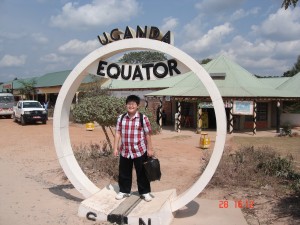 Malcolm, the youngest pilgrim in the group, standing astride the Equator in Uganda. Does he know that liquids flow in opposite directions on account of the different gravitational pulls in the north and south hemispheres – one clockwise and the other counter-clockwise!
Malcolm, the youngest pilgrim in the group, standing astride the Equator in Uganda. Does he know that liquids flow in opposite directions on account of the different gravitational pulls in the north and south hemispheres – one clockwise and the other counter-clockwise!
Copyright © Dr. Jeffrey & Angie Goh, September 2010. All rights reserved.
You are most welcome to respond to this post. Email your comments to jeffangiegoh@gmail.com . You can also be dialogue partners in this Ephphatha Coffee-Corner Ministry by sending us questions for discussion.

